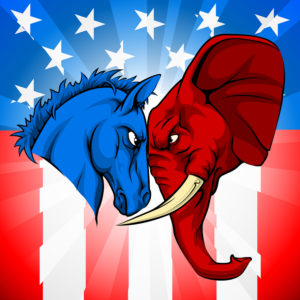Our history is so steeped in a two-party political system it’s natural to assume that political parties are government entities. They aren’t. They are nonprofit corporations. And those two corporations have formed a cartel that shuts out competing parties. For a party’s candidate to be taken seriously, the candidate must be in the televised presidential debates. To get in the debates, a candidate must receive at least 15 percent support in national polls. But to receive significant support in the polls, a candidate needs to appear in the debates. Who created this catch-22? The Commission on Presidential Debates (CPD).
But the CPD isn’t a government entity either. It’s a nonprofit corporation established by…wait for it…the Democratic and Republican Parties. Any other corporations that colluded to bar competitors like this would long ago have been charged with antitrust violations. Yet, the U.S. Supreme Court has turned a blind eye to collusion between the major political parties.
If the Democratic and Republican Parties adequately served voters, that might be a less pressing concern. But evidence shows they don’t. In 2004, voters were evenly split among Republicans, Democrats, and independents. By January 2021, the number of voters self-identifying as independents equaled the number identifying as Republicans or Democrats combined. If that trend continues, independents will constitute a supermajority of voters within the next generation.
When a party can’t attract a majority of voters, that party no longer represents the will of the people. When the major parties together can’t attract a majority of voters, the political apparatus itself no longer represents the will of the people.
For evidence, look at our own behaviors. Many who voted for Donald Trump did so because they disliked him less than they disliked Hillary Clinton. And many who voted for Joe Biden did so because they disliked him less than they disliked Donald Trump. We no longer hope to choose the best candidates but to avoid the worst ones.
We’ve always had two major parties, but they haven’t been the same two. Lincoln’s Republican Party replaced Henry Clay’s Whig Party, which replaced Hamilton’s Federalist Party, and Jackson’s Democratic Party replaced Jefferson’s Democratic-Republican Party. It’s again time for a third party to replace one of the major two.
This is a rare opportunity for the Libertarian Party. But it’s one they will squander. The Libertarians have no Lincoln, Clay, or Hamilton. The Libertarians have no great leaders because the Libertarians don’t take themselves seriously. And consequently, no one else does either.
Political success requires compelling and clearly articulated principles, and the ability to compromise. Libertarians have compelling and clearly articulated principles, but they refuse to compromise. Too many Libertarians happily reject practical ideas for better government in favor of impractical ideas for a perfect one. And in fighting over minutiae as to what constitutes a perfect government, they tear themselves apart, ending up less a cohesive party than a loose confederation of malcontents.
Yet, Libertarians do provide value. The compromise that politics demands erode principles, and erosion of principles is what ails the major parties. The Democratic and Republican Parties have ceased to be associations of voters upholding principles and instead have become electoral machines delivering preferred outcomes to the highest bidders. In the face of necessary compromise, someone needs to keep a steady light shining on principle. On their present course, Libertarians will never rise to power as a political party. But as keepers of philosophical principles, they may well provide guidance to the third party we desperately need.
What is certain is that either a viable third party must soon emerge, or the two major parties will split the country as they continue desperately to hold to power in the name of an ever-shrinking minority of the people.

